
During the weeks of then-Judge Amy Coney Barrett’s confirmation hearings, one case dominated the debate as much as—if not more than—any other: California v. Texas, which had the at least remote potential to completely destroy the Affordable Care Act and knock more than 20 million people off of their health insurance plans during the ravages of a deadly pandemic. Tuesday’s oral arguments suggest that dire scenario is not going to happen, regardless of where Justice Barrett falls on the matter sometime around the coming summer.
That is less because of anything that Barrett asked the parties than the remarks of her conservative colleagues: Chief Justice John Roberts and fellow Trump appointee Brett Kavanaugh.
As anyone who listened to the confirmation hearing may know, whether Obamacare survives hinges upon how the justices land on the topic of severability: the principle that courts should try to preserve a statute as much as possible if they find a portion of its statute unconstitutional. Roberts made clear that he found Texas Solicitor General Kyle Hawkins’s position unavailing.
“It doesn’t look like any other severability clause anywhere else in the U.S. code to me,” Roberts said in a blockbuster remark.
Moments earlier, Roberts noted that Congress spoke clearly by zeroing out the individual mandate but failing to repeal Obamacare, which happened even though there was a Republican majority in the Senate.
“I think that they frankly wanted the Courts to do that, but that’s not our job,” Roberts said.
Kavanaugh told Don Verilli, counsel for the Democratic-controlled House of Representatives: “I tend to agree with you” on the severability question, and he expressed open disagreement with Texas.
“Looking at our severability precedents it seems clear the proper remedy would be to sever the mandate and leave the rest of the act in place,” Kavanaugh noted. “The question to is obviously: How do you get around those precedents on severability which seem on point here?”
One recent court precedent that works against the Lone Star State’s efforts to shoot down the ACA is Seila Law LLC v. Consumer Financial Protection Bureau, which just this past summer weakened the independence of the watchdog established by Senator Elizabeth Warren, D.-Mass., by giving the president the power to fire its director. The high court crucially found, however, that the consumer-protection watchdog could stand.
“The Court made the judgment that Congress would not have preferred that the entire CFPB come crashing down if that independence were eliminated, and I think that that reasoning applies very strongly here,” Verilli said.
After all of the congressional sturm and drang, Barrett did not tip her hand at all on the issue central to the ACA’s continued survival, and she did not appear to ask a single question about severability. She joined some of her conservative colleagues in hypothetical arguments about standing, the legal principle meaning the right to sue. Texas claims that it has the right to challenge Obamacare because the law provides possible penalties for non-compliance. Roberts invented an analogy of a law mandating mowing lawns, a statute with practically little means of enforcement. Justice Clarence Thomas brought the topic down to earth with mask mandates in the age of COVID-19.
Barrett joined her colleagues on the right in their parade of supposing, asking whether there would be standing if the ACA had mandatory certification of compliance.
California Solicitor General Michael Mongan reminded the court that tens of millions of lives hang in the balance of these thought experiments.
“It would cause enormous disruption, cast 20 million Americans off of health insurance during a pandemic and cost the state tens of billions of dollars during a fiscal crisis,” Mongan said. “There is no basis for that result in text, intent, or precedent.”
Verilli echoed those remarks, skewering Texas for taking this issue “as a game of ‘gotcha’ to a whole new level.”
“This is not a game,” Verilli added. “This court’s precedents require respect for the constitutional role of Congress and those precedents emphatically foreclose the outcome respondents seek.”
[Image via Jonathan Ernst-Pool/Getty Images]